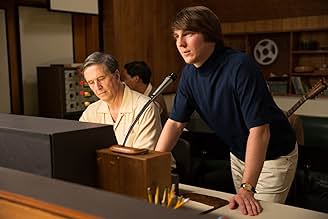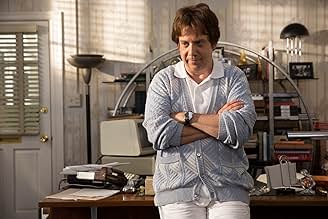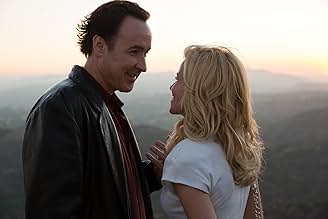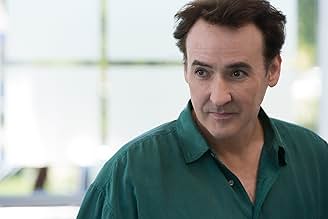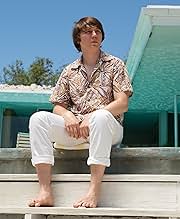Negli anni '60, il leader dei Beach Boys Brian Wilson lotta con la psicosi mentre tenta di realizzare il suo capolavoro pop.Negli anni '60, il leader dei Beach Boys Brian Wilson lotta con la psicosi mentre tenta di realizzare il suo capolavoro pop.Negli anni '60, il leader dei Beach Boys Brian Wilson lotta con la psicosi mentre tenta di realizzare il suo capolavoro pop.
- Regia
- Sceneggiatura
- Star
- Premi
- 20 vittorie e 58 candidature totali
Recensioni in evidenza
While I generally enjoy most music biopics, it's hard to argue with the fact that most of them tend to subscribe to a very familiar pattern. Every once in awhile, a film comes along that break the mold - Todd Haynes did it in 2007 with I'm Not There, which featured six different actors portraying Bob Dylan at various points in his career. That film's writer, Oren Moverman, offers a similarly unconventional approach to Love & Mercy, which hones in on two critical periods during the life of Beach Boys songwriter Brian Wilson.
We first encounter Brian (Paul Dano) during the 1960s, shortly before the band is scheduled to head out for a tour of Japan. Reluctant to return to the road, Brian convinces his brothers that he belongs at home in the studio, where he'll be more effective at creating the band's next album. The boys finally acquiesce, and Brian hires a collection of studio musicians to begin crafting what would ultimately become Pet Sounds.
Our next encounter with Brian comes during the 1980s, where he's portrayed by John Cusack. Brian meets, and attempts to court, Cadillac saleswoman Melinda Ledbetter (Elizabeth Banks), but she quickly discovers that Brian's life is not his own when she meets Dr. Eugene Landy (Paul Giamatti), his therapist and legal guardian. Landy controls every aspect of Brian's existence, from his diet to his personal relationships, all the while insisting that he has Brian's best interests at heart.
The film frequently cuts between these two periods in Brian's life. We see the depths of his imagination and creativity as he employs a range of nontraditional elements to record Pet Sounds, desperately trying to bring to life the music he hears in his head, and all the while sliding further and further into the grip of severe mental illness. And we see the results of that illness, as Brian becomes a timid, broken man, cut off from his friends and family, allowing himself to be controlled and manipulated, and never able to find peace.
Director Bill Pohlad does a marvelous job of illustrating the parallels between each on screen version of Brian Wilson, and both actors give brilliant, emotional performances. Dano in particular turns in what can arguably be called the best work of his career, perfectly embodying Brian's childlike glee as he excitedly flits around the studio, and capturing the anguish and desperation as his mind continues to deteriorate.
Unorthodox in its approach and admirable in its complexity, Love & Mercy wisely chooses not to paint a definitive portrait of a man whose life couldn't possibly be summed up in a two-hour film. By confining the narrative to these two specific chapters, we're able to go far beyond the surface and reveal the inner workings of a tortured genius, and shed light on a story that few people are familiar with. Love & Mercy is a truly exceptional film about the internal and external struggles of a truly exceptional person, and is one of the most emotionally resonant experiences I've had with a film this year.
We first encounter Brian (Paul Dano) during the 1960s, shortly before the band is scheduled to head out for a tour of Japan. Reluctant to return to the road, Brian convinces his brothers that he belongs at home in the studio, where he'll be more effective at creating the band's next album. The boys finally acquiesce, and Brian hires a collection of studio musicians to begin crafting what would ultimately become Pet Sounds.
Our next encounter with Brian comes during the 1980s, where he's portrayed by John Cusack. Brian meets, and attempts to court, Cadillac saleswoman Melinda Ledbetter (Elizabeth Banks), but she quickly discovers that Brian's life is not his own when she meets Dr. Eugene Landy (Paul Giamatti), his therapist and legal guardian. Landy controls every aspect of Brian's existence, from his diet to his personal relationships, all the while insisting that he has Brian's best interests at heart.
The film frequently cuts between these two periods in Brian's life. We see the depths of his imagination and creativity as he employs a range of nontraditional elements to record Pet Sounds, desperately trying to bring to life the music he hears in his head, and all the while sliding further and further into the grip of severe mental illness. And we see the results of that illness, as Brian becomes a timid, broken man, cut off from his friends and family, allowing himself to be controlled and manipulated, and never able to find peace.
Director Bill Pohlad does a marvelous job of illustrating the parallels between each on screen version of Brian Wilson, and both actors give brilliant, emotional performances. Dano in particular turns in what can arguably be called the best work of his career, perfectly embodying Brian's childlike glee as he excitedly flits around the studio, and capturing the anguish and desperation as his mind continues to deteriorate.
Unorthodox in its approach and admirable in its complexity, Love & Mercy wisely chooses not to paint a definitive portrait of a man whose life couldn't possibly be summed up in a two-hour film. By confining the narrative to these two specific chapters, we're able to go far beyond the surface and reveal the inner workings of a tortured genius, and shed light on a story that few people are familiar with. Love & Mercy is a truly exceptional film about the internal and external struggles of a truly exceptional person, and is one of the most emotionally resonant experiences I've had with a film this year.
Greetings again from the darkness. Beach Boys fans may struggle a bit with this one since the light-hearted, airy feel to the "Fun, Fun, Fun" music of the band is mostly absent. Instead, director Bill Pohlad pulls back the curtain on the emotional and mental struggles of visionary songwriter Brian Wilson
the band's creative force.
In an unusual artistic approach, Paul Dano plays Brian from the 1960's period that resulted in the revolutionary Pet Sounds album and the ongoing battle with his domineering father; while John Cusack plays Brian from the late 1980's - his most creatively bankrupt period and the subsequent debilitating influence of quackster psychologist Dr. Eugene Landy (Paul Giamatti).
The two periods are blended together as we (and Brian) bounce back and forth between the struggle of a budding musical genius working to release the sounds in his head, and a middle aged man so heavily medicated that speaking, eating and even getting out of bed are such overwhelming obstacles that music rarely registers. It's during the latter period that Brian is truly at the mercy of Dr. Eugene Landy. Giamatti sports a floppy wig and proceeds to rage at Brian while trying to charm Melinda (Elizabeth Banks), Brian's new romantic interest. Knowing this disgusting period was part of Brian's life only adds to the anger and frustration we feel not just as fans, but as human beings.
What sets this biopic apart is actually the performance of Dano and the peek inside the process of Brian's genius. Watching Brian work the musicians and mold the music on the fly is breath-taking, even though we see the challenges of his early mental issues. It's a joy to see a tribute to the studio session players known as "The Wrecking Crew" themselves the subject of a recent stellar documentary. It's during this period that the Wilson brothers' father (played by Bill Camp) constantly derides Brian and his "new" music. There is also some insight into the Brian vs Mike Love battles – Brian exploring his creative music, while Mike just wants to keep cashing in with their expected "fun" style.
Some may find the two-headed approach to be distracting, but it drives home the point of what a different man he was in comparing the mid-1960's to the late 1980's. Mostly, I found the 1960's portion to be an insight into what we hear from so many geniuses, regardless of their specialty. Brian says it's like "Someone is inside me. Not me." His struggles are non-relatable to others – even his brothers, and especially his dad. What is mostly a look at the darkness behind the "sunny" music, does come with real life redemption courtesy of Melinda's strength and witnessed in the video shown over the closing credits.
In an unusual artistic approach, Paul Dano plays Brian from the 1960's period that resulted in the revolutionary Pet Sounds album and the ongoing battle with his domineering father; while John Cusack plays Brian from the late 1980's - his most creatively bankrupt period and the subsequent debilitating influence of quackster psychologist Dr. Eugene Landy (Paul Giamatti).
The two periods are blended together as we (and Brian) bounce back and forth between the struggle of a budding musical genius working to release the sounds in his head, and a middle aged man so heavily medicated that speaking, eating and even getting out of bed are such overwhelming obstacles that music rarely registers. It's during the latter period that Brian is truly at the mercy of Dr. Eugene Landy. Giamatti sports a floppy wig and proceeds to rage at Brian while trying to charm Melinda (Elizabeth Banks), Brian's new romantic interest. Knowing this disgusting period was part of Brian's life only adds to the anger and frustration we feel not just as fans, but as human beings.
What sets this biopic apart is actually the performance of Dano and the peek inside the process of Brian's genius. Watching Brian work the musicians and mold the music on the fly is breath-taking, even though we see the challenges of his early mental issues. It's a joy to see a tribute to the studio session players known as "The Wrecking Crew" themselves the subject of a recent stellar documentary. It's during this period that the Wilson brothers' father (played by Bill Camp) constantly derides Brian and his "new" music. There is also some insight into the Brian vs Mike Love battles – Brian exploring his creative music, while Mike just wants to keep cashing in with their expected "fun" style.
Some may find the two-headed approach to be distracting, but it drives home the point of what a different man he was in comparing the mid-1960's to the late 1980's. Mostly, I found the 1960's portion to be an insight into what we hear from so many geniuses, regardless of their specialty. Brian says it's like "Someone is inside me. Not me." His struggles are non-relatable to others – even his brothers, and especially his dad. What is mostly a look at the darkness behind the "sunny" music, does come with real life redemption courtesy of Melinda's strength and witnessed in the video shown over the closing credits.
Personal genius has been brilliantly portrayed in film before: "A Beautiful Mind" for maths; "Amadeus" for classical music; and more recently "A Theory of Everything" for cosmology. Behind such genius is often a degree of dysfunction, if not borderline madness.
Here with "Love and Mercy" we get an insight into the creative churning of Wilson's tortured mind. But it is very much a time-banded view, focused on two key periods of his life: 1966, with Paul Dano ("12 Years a Slave"; "Looper") playing Wilson, and the 1990's where Wilson – severely drug-damaged, mentally ill and now played by John Cusack - is being taken for a ride by an unscrupulous and dangerous psychiatrist, Dr Eugene Landy (Paul Giamatti). Playing a key role in his recovery is car saleswoman Melinda Ledbetter (Elizabeth Banks) who Wilson desperately latches onto as a drowning man might grab a life-vest.
Whilst the film could be described as a game of two halves, this is not how it is played out. We jump between both eras without warning, which works extremely well in maintaining the interest in the two parallel stories.
In biopic terms, the 60's segments are probably the more gripping, providing a riveting insight into the production techniques of the iconic "Pet Sounds" album, frequently cited as one of the most innovative and creative albums ever released. The film also features superbly recreated 'old footage' (cinematography by Robert D. Yeoman) showing Beach Boy TV slots and video productions. Wilson's genius is neatly reflected through the admiration of the session musicians: they'd "played with them all" – Sinatra, Presley, Sam Cooke, etc – but Wilson was something else entirely.
Paul Dano is just superb as the troubled youngster, physically and mentally abused by his father (an excellent Bill Camp) and exhibiting mental instability even before the dangers of LSD become evident. His slide into near insanity is brilliantly reflected in an audio soundscape that merges snatched Beach Boy fragments and natural sounds into a cacophony. If Edward Tize and his sound department doesn't get nominated for an Oscar for Best Sound Mixing there is no justice in the world.
In the 90's segments, Cusack delivers his best performance in years as the older Wilson. And after being rude about Elizabeth Banks' directing skills for "Pitch Perfect 2", I feel I have to express my admiration for her portrayal of perplexed astonishment as Melinda, a woman with a mission. Both extremely subtle and utterly enjoyable performances.
In contrast, the excellent Giamatti seems rather over the top as the scheming Landy, although internet articles suggest that it is a scarily accurate portrayal of the degree of control he exerted.
Directed by Bill Pohlad (someone normally found in the production office), it's difficult to fault such a lovingly crafted film. The pre-credits reference to a 'building scream' (I assume relating to the 'goose-bumpy' bit of "Good Vibrations") is never resolved. And (as I rather missed it in the film) the motives for Landy's extreme actions are a bit obscure (in reality, the Wilson family later discovered he was named as a 70% beneficiary in Wilson's will). However, this film, which deserved a broader and better-publicised release, stands as a superb tribute to an iconic musician and comes with a "highly recommended" from me.
(If you enjoyed this review, please see the illustrated version at bob-the-movie-man.com and enter your email address to receive future reviews. Thanks).
Here with "Love and Mercy" we get an insight into the creative churning of Wilson's tortured mind. But it is very much a time-banded view, focused on two key periods of his life: 1966, with Paul Dano ("12 Years a Slave"; "Looper") playing Wilson, and the 1990's where Wilson – severely drug-damaged, mentally ill and now played by John Cusack - is being taken for a ride by an unscrupulous and dangerous psychiatrist, Dr Eugene Landy (Paul Giamatti). Playing a key role in his recovery is car saleswoman Melinda Ledbetter (Elizabeth Banks) who Wilson desperately latches onto as a drowning man might grab a life-vest.
Whilst the film could be described as a game of two halves, this is not how it is played out. We jump between both eras without warning, which works extremely well in maintaining the interest in the two parallel stories.
In biopic terms, the 60's segments are probably the more gripping, providing a riveting insight into the production techniques of the iconic "Pet Sounds" album, frequently cited as one of the most innovative and creative albums ever released. The film also features superbly recreated 'old footage' (cinematography by Robert D. Yeoman) showing Beach Boy TV slots and video productions. Wilson's genius is neatly reflected through the admiration of the session musicians: they'd "played with them all" – Sinatra, Presley, Sam Cooke, etc – but Wilson was something else entirely.
Paul Dano is just superb as the troubled youngster, physically and mentally abused by his father (an excellent Bill Camp) and exhibiting mental instability even before the dangers of LSD become evident. His slide into near insanity is brilliantly reflected in an audio soundscape that merges snatched Beach Boy fragments and natural sounds into a cacophony. If Edward Tize and his sound department doesn't get nominated for an Oscar for Best Sound Mixing there is no justice in the world.
In the 90's segments, Cusack delivers his best performance in years as the older Wilson. And after being rude about Elizabeth Banks' directing skills for "Pitch Perfect 2", I feel I have to express my admiration for her portrayal of perplexed astonishment as Melinda, a woman with a mission. Both extremely subtle and utterly enjoyable performances.
In contrast, the excellent Giamatti seems rather over the top as the scheming Landy, although internet articles suggest that it is a scarily accurate portrayal of the degree of control he exerted.
Directed by Bill Pohlad (someone normally found in the production office), it's difficult to fault such a lovingly crafted film. The pre-credits reference to a 'building scream' (I assume relating to the 'goose-bumpy' bit of "Good Vibrations") is never resolved. And (as I rather missed it in the film) the motives for Landy's extreme actions are a bit obscure (in reality, the Wilson family later discovered he was named as a 70% beneficiary in Wilson's will). However, this film, which deserved a broader and better-publicised release, stands as a superb tribute to an iconic musician and comes with a "highly recommended" from me.
(If you enjoyed this review, please see the illustrated version at bob-the-movie-man.com and enter your email address to receive future reviews. Thanks).
The performances of both Paul Dano and John Cusak are Oscar worthy. It's hard to believe all that sunny happy music came from such a dark place. Long heralded as a genius to see Brian Wilson during the making of Pet Sounds is astonishing. To see Brian Wilson later is heart wrenching. Stay for the credits. You will go back to listen to Pet Sounds with a whole new appreciation. Elizabeth Banks also gives a first rate performance as his girlfriend. It really is amazing to see how John Cusak captured Brian's mannerisms and voice. The way the story is told is unique in it's mix of the use of both actors. Should be a tough contender come awards season next year.
This is the story of Brian Wilson during two time periods. In 1964, Brian Wilson (Paul Dano) has a panic attack and quits touring with the band. Instead he concentrates on writing for the new record Pet Sounds. He struggles from his abusive father and starts hearing voices. In the 80s, Brian (John Cusack) is under the control of his therapist Dr. Eugene Landy (Paul Giamatti). He buys a car from saleswoman Melinda Ledbetter (Elizabeth Banks) who eventually breaks Landy's hold on him.
This is a compelling biopic of an interesting person. Paul Dano really hits it out of the park. His section has some great scenes. On its own, John Cusack does a great job. Put together, I can't help but think that Cusack is doing a passable imitation of Dano's performance. I'm not judging their relative acting skills. I just think that Dano has always played this type of character and he simply fits better. I'm certain that Dano would be nominated for an Oscar if he played both time periods. Landy is the villain of the piece and Giamatti plays him with gusto. For a more nuanced character, the movie needs to show his character saving Brian at the beginning. Splitting the time period so neatly does lessen some important sections of Brian's life.
This is a compelling biopic of an interesting person. Paul Dano really hits it out of the park. His section has some great scenes. On its own, John Cusack does a great job. Put together, I can't help but think that Cusack is doing a passable imitation of Dano's performance. I'm not judging their relative acting skills. I just think that Dano has always played this type of character and he simply fits better. I'm certain that Dano would be nominated for an Oscar if he played both time periods. Landy is the villain of the piece and Giamatti plays him with gusto. For a more nuanced character, the movie needs to show his character saving Brian at the beginning. Splitting the time period so neatly does lessen some important sections of Brian's life.
Lo sapevi?
- QuizThe real Wilson reported having a mild dissociative experience while watching the film. He started to believe that Paul Giamatti was the actual Eugene Landy and felt "absolutely in fear" for several minutes.
- BlooperContrary to what is shown, the recording for "Good Vibrations" began during the making of "Pet Sounds", not after.
- Citazioni
Brian Future: I want you to leave, but I don't want you to leave me.
- Curiosità sui creditiFirst, there's concert footage of the recent Brian Wilson, himself, singing "Love & Mercy", and then at the very end there is audio of a brief recreated studio recording of Good Vibrations, with '60s Brian leading the dialogue.
- Versioni alternativeThe version which premiered at the 2014 Toronto Film Festival and a few subsequent public screenings contained a few extra scenes, such as an "I Get Around" studio sequence, and a scene where Wilson meets Phil Spector on the street. The closing song "One Kind of Love" was also absent from this cut.
- Colonne sonoreSurfin' U.S.A.
Written by Chuck Berry
Lyrics by Brian Wilson (uncredited)
Performed by The Beach Boys
Courtesy of Capitol Records
Under license from Universal Music Enterprises
I più visti
Accedi per valutare e creare un elenco di titoli salvati per ottenere consigli personalizzati
- How long is Love & Mercy?Powered by Alexa
Dettagli
- Data di uscita
- Paese di origine
- Siti ufficiali
- Lingua
- Celebre anche come
- Tutto per la musica - Brian Wilson & The Beach Boys
- Luoghi delle riprese
- Aziende produttrici
- Vedi altri crediti dell’azienda su IMDbPro
Botteghino
- Budget
- 10.000.000 USD (previsto)
- Lordo Stati Uniti e Canada
- 12.551.031 USD
- Fine settimana di apertura Stati Uniti e Canada
- 2.122.177 USD
- 7 giu 2015
- Lordo in tutto il mondo
- 28.641.776 USD
- Tempo di esecuzione2 ore 1 minuto
- Colore
- Mix di suoni
- Proporzioni
- 1.85 : 1
Contribuisci a questa pagina
Suggerisci una modifica o aggiungi i contenuti mancanti







